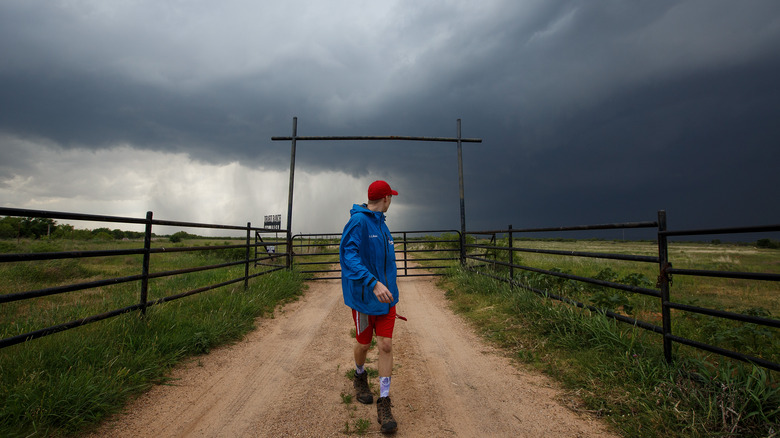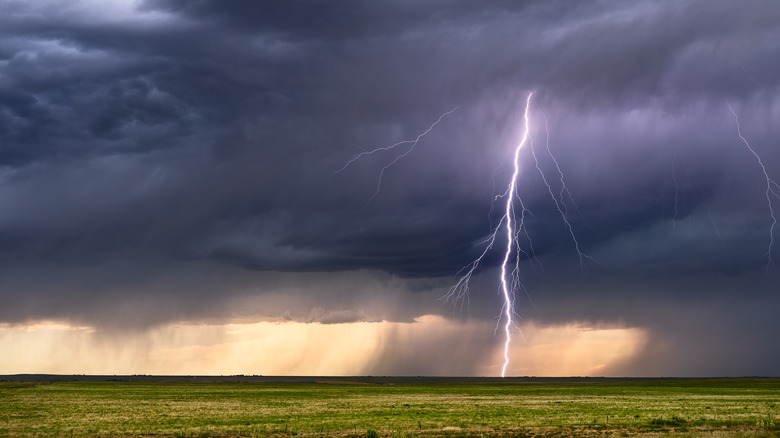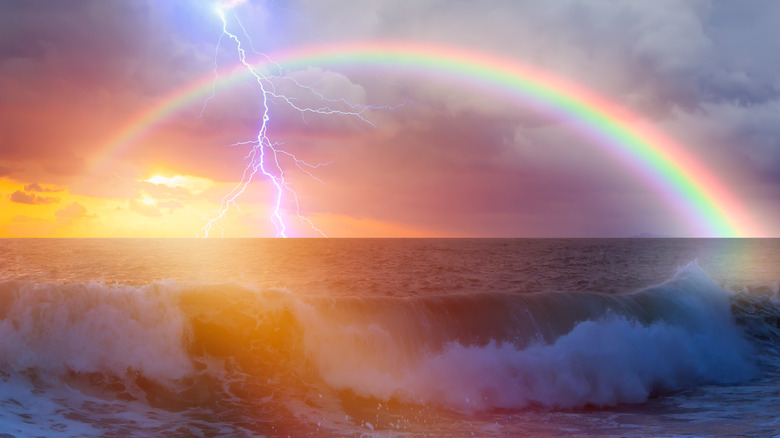What Would Happen If Thunderstorms Didn't Exist?
When some think of thunderstorms, they think of peaceful nights rocked to sleep by the sounds of rain tapping softly at their window. Others think of all the detriment more severe thunderstorms leave in their wake. Flash flooding, mudslides, lightning damage, and even hail are not uncommon during storms. In fact, the effects of thunderstorms kill more people each year than hurricanes, twisters, and lightning strikes combined due to their prevalence (via NOAA National Severe Storms Lab).
Thunderstorms can even turn into those anvil-shaped clouds that appear towering eastward in the sky (via NOAA National Weather Service). These are called supercells, and although the least common type of thunderstorm, they are likely to produce severe weather like strong winds, giant hail, and even tornadoes. Considering these wild weather systems are found most frequently in the central part of the United States, it makes you wonder if in the fictional universe of "The Wizard of Oz," a supercell was the cause of the twister that made Dorothy utter, "Toto, I have a feeling we're not in Kansas anymore."
Despite how dangerous these storms can be, have you ever pondered what would happen if they didn't exist? Sure, we wouldn't have the chance to hear those relaxing rumblings in our slumber, and the world would also likely have considerably less water — but it goes deeper than that (pun intended). Rising pollution rates, unstable weather systems, and more would be in-store for an Earth without storms.
Environmental Collapse
Thunderstorms are created when humid air rises into cold air (via UCAR Center for Science Education). When the rapid cooling creates water vapor, it forms raindrops through condensation. The air continues to cycle, dropping lower, warming itself, and then rising again. Thunderstorms help the atmosphere release energy, releasing heat and cooling everything down with rain (via NOAA National Severe Storms Lab). These storms also help our planet stay electrically sound. Considering Earth's surface is negatively charged and the atmosphere positively charged, the bond between the two conducts massive amounts of electricity. In order to keep that electrical balance in check (no, we're not talking about utilities here), negatively-charged lightning helps transfer negative charges back down to Earth.
Although the chance of being struck by lightning is less than one in a million per year with a 90% survival rate (via CDC), we spent our childhoods being told to avoid metal things and swimming in the rain. Considering what we've learned, lightning is a pretty cool cat for the bad rap it's earned. It even helps create and sustain our ozone layer with the oxygen it produces — protecting us from peril via UV radiation — and produces nitrate from nitrogen, which is a fertilizer needed for plants to grow and life to thrive on this planet (via Earth Eclipse). Lightning also creates oxidants, reacting with and cleansing the atmosphere of pollutants like methane (via Science News for Students).
Thunderstorms are underappreciated
Without thunderstorms, we would have an unstable atmosphere, no plants, no food, dirty air, and obviously, significantly less water flowing through the atmosphere. If total environmental downfall was not enough, the lack of audio from thunderstorms could affect humans as well. Remember when we talked about how relaxing it is to fall asleep to rain? Well, there's things that natural sounds can do that your white noise machine from Amazon cannot.
Thunder therapy ... it's a real thing. A 2016 study by Brighton and Sussex Medical School in England proved that nature's own soundtrack — with hit songs like "Trickling Stream" and "Calming Storm" — was the key to soothing even the most stressed of minds (via Better Homes and Gardens). However, only the real deal will suffice — and not artificially-simulated covers. In fact, the study found artificial sounds cause an alternate effect, like inward-focused attention, linked with conditions such as PTSD, anxiety and depression. But those who listened to true nature sounds expressed more external-focused attention, able to relax and find relief from anxiety-related conditions. So, there you have it. If you want to eat, breathe clean air, drink clean water and quell the storm within, you should appreciate thunderstorms more.
If you or someone you know is struggling with mental health, please contact the Crisis Text Line by texting HOME to 741741, call the National Alliance on Mental Illness helpline at 1-800-950-NAMI (6264), or visit the National Institute of Mental Health website.


